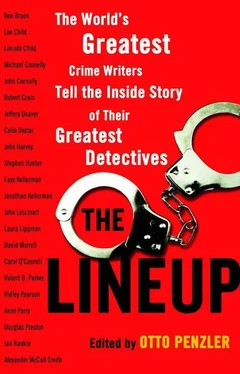Otto Penzler - The Lineup - The World's Greatest Crime Writers Tell the Inside Story of Their Greatest Detectives
Здесь есть возможность читать онлайн «Otto Penzler - The Lineup - The World's Greatest Crime Writers Tell the Inside Story of Their Greatest Detectives» весь текст электронной книги совершенно бесплатно (целиком полную версию без сокращений). В некоторых случаях можно слушать аудио, скачать через торрент в формате fb2 и присутствует краткое содержание. Жанр: Прочая документальная литература, на английском языке. Описание произведения, (предисловие) а так же отзывы посетителей доступны на портале библиотеки ЛибКат.
- Название:The Lineup: The World's Greatest Crime Writers Tell the Inside Story of Their Greatest Detectives
- Автор:
- Жанр:
- Год:неизвестен
- ISBN:нет данных
- Рейтинг книги:4 / 5. Голосов: 1
-
Избранное:Добавить в избранное
- Отзывы:
-
Ваша оценка:
- 80
- 1
- 2
- 3
- 4
- 5
The Lineup: The World's Greatest Crime Writers Tell the Inside Story of Their Greatest Detectives: краткое содержание, описание и аннотация
Предлагаем к чтению аннотацию, описание, краткое содержание или предисловие (зависит от того, что написал сам автор книги «The Lineup: The World's Greatest Crime Writers Tell the Inside Story of Their Greatest Detectives»). Если вы не нашли необходимую информацию о книге — напишите в комментариях, мы постараемся отыскать её.
The most venerated and bestselling authors in the mystery world reveal how they created their most beloved serial characters.
The Lineup: The World's Greatest Crime Writers Tell the Inside Story of Their Greatest Detectives — читать онлайн бесплатно полную книгу (весь текст) целиком
Ниже представлен текст книги, разбитый по страницам. Система сохранения места последней прочитанной страницы, позволяет с удобством читать онлайн бесплатно книгу «The Lineup: The World's Greatest Crime Writers Tell the Inside Story of Their Greatest Detectives», без необходимости каждый раз заново искать на чём Вы остановились. Поставьте закладку, и сможете в любой момент перейти на страницу, на которой закончили чтение.
Интервал:
Закладка:
It was the Americans who discovered Mma Ramotswe. I owe everything to my American readers, who bought the books in large numbers. Like any country, the United States has its faults, but at heart Americans are a kind and generous-spirited people, and the country remains a beacon in the darkness of this world.
9
But who is she, this woman from Botswana who has somehow succeeded in speaking to so many very different people?
Her name is Precious Ramotswe, and she is called Mma Ramotswe. Mma is the honorific for a woman and is pronounced mar, with a slight emphasis on the m sound. She is the daughter of the late Obed Ramotswe, a miner who went from Botswana to work in the gold mines in South Africa. Her mother died when she was very young, and Precious was brought up by her father and a female cousin of his. She does not remember her mother, but she remembers her father very well and thinks of him constantly. “Not a day goes past,” she says, “not a day but I think of my late daddy, Obed Ramotswe, miner, citizen of Botswana, and a great judge of cattle.”
Obed Ramotswe was a good man. In his daughter’s mind he represents the old Botswana values-those of integrity and concern for others. She remembers his moral example and his love for her. He was proud of his daughter, just as he was proud of his country.
People sometimes say to me that I rather overstate the pride people in Botswana feel for their country. I do not think I do. The Batswana are immensely proud of their country and of what it has achieved in the forty or so years since independence. They have built a prosperous country, brick by brick. They have done so by their own efforts. They have avoided getting into debt. They have been consistently democratic and they have observed the rule of law through all those four decades, even when they have been surrounded by countries in conflict. They have every reason to be proud.
A few years ago I had a conversation with a man in Botswana about his country. Our conversation was being filmed by the BBC for a television show. I asked him, “Are you proud of your country?” and he replied, “Yes, I am very proud of Botswana. I am proud to be a Motswana.” And then I saw that tears had come into his eyes.
10
Precious Ramotswe stayed at school until she was sixteen and then she had a series of smallish jobs. She met a handsome trumpeter called Note Mokoti, and she married him. It was a terrible mistake, of the sort that any young person can make when confronted with glamour or good looks. Note was a bad husband and he was violent toward her, hurting her.
She had a baby, who lived only a matter of hours. She was able to hold this small scrap of humanity until death took the child from her. Note did not even come to the funeral. Her father, Obed, took her back when Note left. He did not gloat, although he had seen Note for what he was; he simply took her back into his home.
In due course Obed himself became ill. The mines had ruined his lungs, and the damage that they had done caught up with him. Part of Mma Ramotswe’s world ended when Obed died. Part of Botswana, this country she loved so much, seemed to wither and recede into the past.
11
She sold a number of the cattle her father had left her and set up her little detective agency near Kgali Hill, on the edge of Gaborone. She had no idea of how to be a private detective, but she managed to get hold of a manual by one Clovis Andersen. This book, The Principles of Private Detection, became her main guide, even if a lot of the advice it gave struck her as being merely a matter of common sense. Incidentally, I am often asked by readers where they can purchase a copy of The Principles of Private Detection. I reply that the book does not exist, which I think causes them disappointment. Perhaps I shall write it myself. Certainly, in a future book I shall write about a visit that Clovis Andersen makes to Botswana. Mma Ramotswe will meet him and will, with her characteristic kindness, do something to help him. I see Clovis Andersen as a bit of a failure; he may be able to write about being a private detective, but I suspect that he will never have been very good at the job.
Mma Ramotswe acquired an assistant, Mma Makutsi, a graduate of the Botswana Secretarial College who, in the final examinations of that college, achieved the hitherto unheard-of result of 97 percent. That 97 percent is of immense importance to Mma Makutsi, and she often refers to it. She represents all those who have had to battle to get anywhere in life. She comes from a poor background in the north, and she has had to make do with very little in the material sense. She is a resourceful and intelligent woman, however, and in the later books she finds a kind and wealthy fiancé, Phuti Radiphuti, the proprietor of the Double Comfort Furniture Store. Mma Ramotswe likes Phuti. She sees him as an entirely suitable husband for her assistant.
Mma Ramotswe’s husband is Mr. J.L.B. Matekoni, the owner of Tlokweng Road Speedy Motors and the finest mechanic in all Botswana. He is a good man, but he has certain minor failings, one of which is indecision. It took him a very long time to get round to marrying Mma Ramotswe. Indeed, it was not until the fifth book that this happened, and prior to that I had received many letters from readers inquiring as to why the engagement was proving to be such a long one. But they did eventually get married, in a ceremony performed at the Orphan Farm, with the children singing the hymns and the women ululating with pleasure.
The newly married couple moved into Mma Ramotswe’s house on Zebra Drive. They are extremely happy: Mr. J.L.B. Matekoni running his garage and she helping people to solve what she calls “the problems in their lives.” These are often minor personal issues, although every so often something more serious crops up. Mma Ramotswe does not deal with significant crime, however; she is concerned with minor instances of bad behavior, and she usually deals with the offender by getting him or her to promise to behave better in future.
Is life really like that? Do people turn over new leaves and reform simply because they have been shamed into doing so by a woman like Mma Ramotswe? Probably not. One has to be realistic about human nature, which is often quite perverse. At the same time, Mma Ramotswe understands that you do not get people to be better people simply by punishing them. Those to whom evil is done do evil in return. W. H. Auden knew that and expressed the thought rather effectively in one of his poems.
Mma Ramotswe believes in forgiveness. “I am a forgiving lady,” she says in one of the books. Again, she is very wise. Forgiveness is a great virtue, which unfortunately we may sometimes lose sight of when retribution holds center stage. But we really should be readier to forgive people than to hate them or seek to harm them. Forgiveness allows us to look to the future rather than concentrate on the past. Forgiveness heals.
One of Mma Ramotswe’s great heroes is Nelson Mandela. Mandela, perhaps more than any other figure in the twentieth century, showed us all how forgiveness can bring an unhappy chapter to an end. Mma Ramotswe understands that. So we should not be surprised when she lets people off. That does not mean that she condones what they have done or underestimates its impact. It is just that she sees the sterility of pure retribution. She does not believe that we are helped by inflicting further suffering where there has already been significant pain and distress. I think she is right.
12
Is she a paragon of virtue, some sort of saint? Certainly not. Mma Ramotswe is very human and has her weaknesses. This humanity, I think, is why people respond warmly to her. They see that she, like the rest of us, has those temptations that she finds very difficult to resist.
Читать дальшеИнтервал:
Закладка:
Похожие книги на «The Lineup: The World's Greatest Crime Writers Tell the Inside Story of Their Greatest Detectives»
Представляем Вашему вниманию похожие книги на «The Lineup: The World's Greatest Crime Writers Tell the Inside Story of Their Greatest Detectives» списком для выбора. Мы отобрали схожую по названию и смыслу литературу в надежде предоставить читателям больше вариантов отыскать новые, интересные, ещё непрочитанные произведения.
Обсуждение, отзывы о книге «The Lineup: The World's Greatest Crime Writers Tell the Inside Story of Their Greatest Detectives» и просто собственные мнения читателей. Оставьте ваши комментарии, напишите, что Вы думаете о произведении, его смысле или главных героях. Укажите что конкретно понравилось, а что нет, и почему Вы так считаете.












